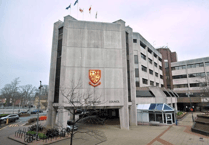SEPTEMBER 1916 and the Battle of the Somme on the Western Front was into its third stage. Back in Britain, German prisoners of war were being held in camps, one of them being at Frith Hill, Frimley.
PoWs from the camp went out on supervised work parties. Some of them were building a three-mile extension of the railway branch line to Bisley camp, linking it to the army camps at Pirbright, Deepcut and Blackdown.
On Monday, 25 September, five Germans on a work party escaped and were on the loose for two days. News soon spread and an intensive search was mounted by the military and the police using bloodhounds.
It was reported in the local press that Police Sergeant Kenward of Camberley received a report of the escape at about 8pm and “lost no time in getting to work”. He kept four pedigree bloodhounds and the escape gave him his first real opportunity to test their usefulness.
At Pirbright, some articles of clothing belonging to the Germans were placed in front of the dogs, who picked up the trail at about 10pm The scent took a zig zag course and eventually led to the main railway line some distance from Brookwood station.
According to a press report at the time, an army officer from Frith Hill recognised the footprints of the men “by reason of the very large nails in their boots”. The footprints led the search party towards Brookwood. However, at 2.30am the next day, “owing to passing trains and other circumstances, the hounds could not make no further headway and were taken off”.
Within a wide area surrounding Pirbright soldiers with fixed bayonets, regular and special police constables kept a close watch on bridges, road junctions and other strategic points. Likely hiding places were also searched.
In Goldsworth Road, Woking, a suspicious-looking man was arrested, widely assumed to be one of the prisoners, but he was a burglar breaking into a house!
Another bloodhound was brought by a Mr Warner of Twford, and despite a thorough search of Brookwood Cemetery, the dog did not pick up the trail of the escapees.
Another false alarm was a report of “two foreigners” who had stopped a soldier at Worplesdon railway station and demanded his uniform, threatening violence if he did not comply. The soldier evidently ran off. However, a score of special constables hurried to the spot and searched the area for several hours but did not find those two men.
During this search, two of the constables fell into a “sunken receptacle for the drainage of styes" – possibly a pit full of pig manure.
Wet through and with their clothes ruined, they nevertheless resumed their search, but afterwards joked that although they had not found the Germans, at one point they were upon a very strong scent!
Finally, on the Wednesday, a special constable found three of the escaped Germans asleep by the side of the road between Ascot and Bracknell. He took the men to the nearby Royal Foresters Hotel and rang for assistance. The Germans were sailors William Bruns and Gustav Schmidt, and airman Richard Mohr.
The following day the other two, also sailors, Kyle Michaelski and Peter Mathieson, were found by a gamekeeper in the same area. Evidently, one tried to run away, but the gamekeeper raised his gun ordered the man to stop, which he did.
The prisoners later said they had narrowly escaped being found by the bloodhounds on the Monday night. They added they had been wandering around the woods, sleeping during the day and travelling by night. They had lived chiefly on chocolate and cheese, which they had in their possession at the time of their escape.
Thanks to Mark Coxhead, who researched this tale and provided the photo.




